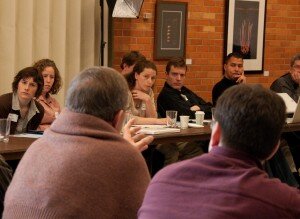Friendship Collaborative Update
The University of Michigan, represented by facilitator Howard Hu, hosted a Friendship Collaborative workshop this past Friday at the beautiful Matthaei Botanical Gardens in Ann Arbor, MI. Some great scientific minds were there as well as a number of local and regional evangelical leaders. Why such a gathering? Simply put, to form friendships that will act as bridges of communication between two groups of people which for some time now have fought either passively or actively against each others efforts. Because there are people in both camps with great passion for the cause of environmental stewardship, hopes are high that enough common ground can exists to enable strong cooperation.
Facilitators Carl Safina from the Blue Ocean Institute and Ken Wilson from the Vineyard Church of Ann Arbor both did an excellent job of fostering thought-provoking discussions. Dr. Safina focused on the effects humanity is having on the Earth, concentrating on his personal area of interest, the sea and the life that thrives there. Wilson offered scientists an idea of what a well-informed layperson’s scientific knowledge might look like. He also suggested that the evangelical community should honor the virtue of prudence with respect to climate change science, and both men exhorted all present to work together in hopes of being more effective as environmental stewards.

The event, however, was not all business. As its namesake implies, the Friendship Collaborative seeks to build continuing relationships between environmental scientists and evangelical leaders. This was fostered at the workshop by allowing for a series of roundtable discussions, including lunch, where groups of scientists and evangelicals were able to sit in a relaxed environment and discuss things held in common. All participants in attendance were exceedingly gracious; conversations were honest, but always in good spirit. One common theme mentioned as the entire group reconvened was that of trust between the two groups, which unfortunately are too often polarized.

